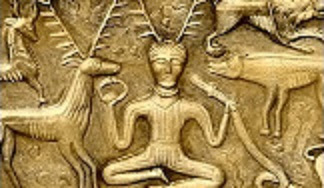
 |
| Shamanism is a worldwide spiritual impulse that arises spontaneously in some individuals. |
.
 What is a "shaman"? This is a tricky question, to be certain. While there are many facets and nuances that will not be addressed here, the following article provides a basic framework for understanding what shamanism is...
What is a "shaman"? This is a tricky question, to be certain. While there are many facets and nuances that will not be addressed here, the following article provides a basic framework for understanding what shamanism is...- (Wisdom Quarterly) The Buddhist definition of a shaman is a "wandering ascetic," a shraman as distinct from a "temple priest" or Brahmin. When the Scythian/Sakyian Prince Siddhartha Gautama wanted to become a seeker or recluse or shaman it was because he was inspired by the sight of one.
- Therefore, Buddhism did not invent the concept. There already existed in Central Asia (the area of the world from Northwest India up to North Asia, Ukraine, and Siberia) spiritual wanderers on quests of one kind or other, driven by spirit voices or other impulses, such as the quest for enlightenment (bodhi) and liberation (moksha). Vedic seers (rishis) and sadhvis/sadhus (holy persons), yogis and munis (ascetics, mendicants, sages). The Scythian Sage, Shakya-muni, is a popular title of the Buddha, who encouraged his monastic followers to adhere to a wandering lifestyle (Sramana Movement) and a forest tradition of meditation away from the maddening crowd.
 |
| Young samanera studying text in Burma |
 |
| Buddhist shaman, Yarchen Gar Monastery (F) |
This leaves room for multiple ways of understanding shamanism without any particular way being held as right or wrong.
 |
| Medicine men: often women |
The common element is not the content of what is understood but the experience of the shamanism itself -- which makes it "authentic."
From that perspective, then, any attempt at a single definition is irrelevant. But there is value in bringing integrity and coherence to an understanding of shamanism, if only to operate with clarity and precision of definition.
 |
| Mexican shamans are curanderos ("healers") often confused with brujos ("witches") |
DEFINITION
 The common, classical definition runs: Shamanism is a system or practice of a practitioner, the shaman, who willfully changes her or his state of consciousness from normal to altered in order to enact something, communicate with something, or to perform some specific duty on the behalf of another person, community, or group.
The common, classical definition runs: Shamanism is a system or practice of a practitioner, the shaman, who willfully changes her or his state of consciousness from normal to altered in order to enact something, communicate with something, or to perform some specific duty on the behalf of another person, community, or group.
Often this altered state of consciousness is framed as a movement from this world to the "spirit world." More
































































































































































































































No comments:
Post a Comment